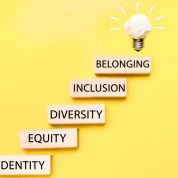
In times of political and social unrest, it’s more important than ever to acknowledge the need for anti-bias training and an active focus on diversity in the business world. We often hear about gender equality in the corporate sphere but fail to recognize that unfairness can stem from far more than gender-based differences. In order to create equal opportunities within organizations and promote a healthy work environment, all forms of bias must be addressed and accounted for — biases based on race, ethnicity, sexual orientation and other areas as well as gender identity. Not only will such proactive policy encourage workplace diversity but also ensure efficient decision making on behalf of employees at all levels across the organization resulting in improved productivity. In this blog post we discuss why fostering safe working conditions with no margin for discriminatory practices is paramount if businesses wish to take advantage of the benefits that come alongside inclusive environments.
Why businesses need to address bias and diversity
The importance of diversity and inclusion in the workplace has become increasingly evident as businesses strive to create a competitive, equitable and enjoyable work culture. Diversity drives innovation, strengthens relationships, builds trust and increases productivity. It also leads to greater engagement among all employees—regardless of race, gender, age or other factors. When organizations value diversity and promote fairness and respect for all individuals, they create an environment that is more conducive to collaboration, creativity and ultimately more successful business outcomes.
Businesses need to address bias in order to ensure equal opportunities are available to everyone who deserves them regardless of their backgrounds or beliefs; creating a culture of acceptance rather than exclusion can help foster employee engagement while increasing potential profits. By eliminating discriminatory hiring practices such as relying on outdated stereotypes and overlooked qualified candidates, businesses can create a more diverse workforce. Additionally, organizations should undertake initiatives to ensure employees are not subject to biased decision-making in the workplace such as microaggressions or inappropriate comments due to their identities.

Moreover, companies need to make sure that they recognize and celebrate the varying backgrounds of their employees; encouraging diversity from an early stage sets the tone for a safe and respectful work environment that fosters creativity and innovation. Doing so encourages respect for different perspectives, builds trust within teams, strengthens communication between colleagues and increases efficiency. Leaders must also promote inclusive policies at all levels of management in order to ensure everyone feels represented and respected in the workplace.
By creating an environment where bias is addressed and diversity is respected, businesses can foster a positive work culture that will help them to attract the best talent, increase employee engagement and productivity, and ultimately be more successful. Ultimately, it is critical for businesses to prioritize addressing bias and creating an inclusive workplace in order to ensure their success in the long term.
Promoting diversity and inclusion in the workplace
In addition to the challenges of changing established mindsets and breaking down barriers that may exist, it can also require a significant shift in how companies approach recruitment, hiring, and leadership development. Having a diverse workforce is essential for many reasons: it enhances creativity, productivity, innovation and collaboration; it provides access to different perspectives which helps foster better decision-making; and it allows for greater understanding across cultures and genders.
Organizations should make sure that their workplace practices are equitable and respectful at all levels. This means actively recruiting from underrepresented groups, creating paths to advancement for diverse talent through mentorship programs or career development initiatives, and making sure employees feel comfortable bringing up concerns related to diversity. It’s also important to have clear policies against discrimination and harassment.
It is also important to recognize that the journey towards inclusion does not end there. Companies should continue to evaluate and improve their policies on an ongoing basis, as well as foster a culture of continuous learning and open dialogue. By creating an environment where everyone feels accepted, respected, and valued, organizations can create a lasting impact on their workforce, customers, and community.

In addition to providing resources for internal initiatives related to diversity and inclusion in the workplace, companies should also invest in external outreach efforts that focus on creating awareness about different minority groups. This may include sponsoring events or scholarships targeted at underrepresented communities or partnering with community organizations dedicated to issues like racial justice or gender equality. Ultimately, these investments will help create a more equitable and inclusive society, which is beneficial to everyone.
As companies strive to create an environment of inclusion and social justice in their workplaces, it’s important to remember that diversity and inclusion are ongoing processes that require constant effort and commitment from all levels of the organization. By taking steps to ensure equity, respect, and understanding throughout the workplace, companies can foster an atmosphere where everyone feels respected, valued, and appreciated – regardless of race, gender identity or sexual orientation. This will not only help them attract top talent but also increase morale among employees – leading to improved performance and greater success.
The key takeaway is that promoting diversity and inclusion takes conscious effort on all fronts – recruitment, leadership development, internal policies, and external outreach. Companies that take the initiative to foster a culture of acceptance, understanding, and equity will be rewarded with a more productive workforce and a stronger reputation in their community. It’s an investment worth making if you want to create a workplace where everyone can thrive.
Finally, it is important for organizations to remember that diversity goes beyond just race or gender; it also includes age, religion, sexuality, physical ability and other forms of identity. By valuing all individuals equally and advocating for fairness at all levels of the organization, companies can create an inclusive environment that supports everyone’s unique background. With this approach in place, companies will not only attract the best talent but will also promote social justice within their own walls – allowing them to meet their business goals while doing some good in the world.
It is clear that diversity and inclusion are key components of a successful business. By actively promoting equity, respect, and understanding at all levels of the organization, companies can create an environment where everyone feels valued and respected for who they are – leading to greater success in all areas of their operations. It’s a worthwhile investment for any company looking to foster a truly inclusive workplace culture.

 New Leaf and Company is a executive coaching organization for small and midsize businesses. For more than 25 years we’ve been helping CEOs, business owners and key executives solve their toughest challenges through a comprehensive approach to success. At the heart of our proven formula is confidential peer advisory groups and executive coaching sessions.
New Leaf and Company is a executive coaching organization for small and midsize businesses. For more than 25 years we’ve been helping CEOs, business owners and key executives solve their toughest challenges through a comprehensive approach to success. At the heart of our proven formula is confidential peer advisory groups and executive coaching sessions. 